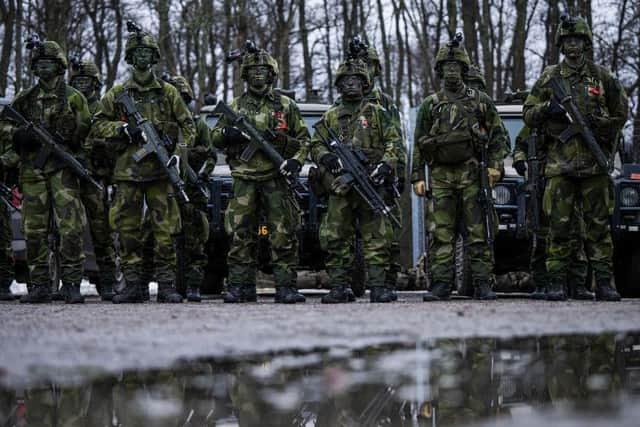Sweden NATO membership: What will Sweden’s accession to the alliance mean for Scotland and the rest of the UK?
When Hungarian prime minister Viktor Orban announced that his country’s long standing feud with Sweden was over, removing the block for the Scandinavian nation to join NATO, the words he chose to use were telling.
Announcing a military deal that would see Hungary buy four Gripen planes from Sweden, Mr Orban said that while the two nations did not agree on everything, they were “prepared to die for each other”.
Advertisement
Hide AdAdvertisement
Hide AdThe announcement removes the final barrier for Sweden’s membership of the organisation, coming a month after Turkey also ended its disagreement with Sweden and removed its objection.


What is most noteworthy here is that Mr Orban’s choice of language brings to the fore the very essence of the North Atlantic Treaty Organisation – commonly known as NATO.
While inevitably a highly complex organisation, with varying aims including pledges such as consultations among Allies on security matters of common interest, the part of the treaty known as Article Five is what he is undoubtedly referring to.
Under the rule, if any member country is attacked, it is counted as an attack on NATO as a whole, meaning the might of 31 nations – including the UK - would stand together against the attacker. This includes countries like the US and the UK, which are nuclear powers, which are seen as a huge deterrent for any potential aggressor.
Scotland’s geographic location gives it a particularly important role in meeting defence and security objectives in the North Atlantic and the group of Nordic countries known as the High North.
As part of a report published by Westminster’s Scottish Affairs Committee in last year, a submission by the Ministry of Defence described Scotland’s proximity to the waters and skies above the North Atlantic is “of crucial importance to the UK, and NATO’s security”.
In a submission to the same report, Nicolas Jouan of research institute RAND Europe described Scotland as a “physical asset” to the UK “because it is a convenient launching platform for planes and ships, commercial or military, active in the region.”
Meanwhile, armed forces minister James Heappey, in reference to the potential implications of Scottish independence on NATO’s defence strategy, has said any movement of Faslane or Lossiemouth bases would have huge implications for NATO.
Advertisement
Hide AdAdvertisement
Hide Ad“If we had to move the base for nuclear-powered and nuclear-armed submarines to a different geography…the whole of NATO would be incredibly concerned by the loss of that base,” he said.
“It is an enormously important part of NATO’s ability to police the Greenland-Iceland-UK gap and to deter Russian nuclear-armed and nuclear-powered submarines from getting out into the Atlantic and threatening our NATO supply lines.”
Both Sweden and Finland had previously remained neutral, opting to stay out of the alliance, partly due to their proximity to Russia, with which Finland shares a border. However, that changed after Russia’s invasion of Ukraine in February 2022 sparked fears that president Vladimir Putin could have his sights set on further military targets.
Ukraine is not a member of NATO and as such, did not have NATO protection when it was invaded by Russia. Western allies have supplied some military equipment and air defence systems, but have not sent their own troops to fight on Ukraine’s side.
In recent days, there have, however, been discussions over some European Union countries potentially considering sending soldiers to support Ukraine. French president Emmanuel Macron said the idea “should not be rules out”, sparking opposition from many quarters.
Sweden’s NATO membership has been a long time coming. It initially applied to join NATO alongside its neighbour, Finland, 18 months ago. Finland joined very quickly, however, Sweden initially faced a block from Turkey, over claims of Swedish support to Kurdish separatists. Turkish Prime Minister Recep Tayyip Erdogan performed a u-turn last month, after in June, Sweden introduced tougher anti-terror laws, which make it illegal to finance or help terror groups.
Hungary remained Sweden’s major sticking point. In March, Hungarian government spokesman Zoltán Kovács accused Swedish officials of sitting on a "crumbling throne of moral superiority", in a row concerning Hungary’s democratic principles and its ability to meet standards set by the European Union. The eastern European nation has rolled back on issues such as LGBTQ+ rights in recent times and critics have warned that freedom of the press had been eroded.
Now, however, that block has been lifted and the process for Sweden’s accession to the group will begin.
Comments
Want to join the conversation? Please or to comment on this article.
